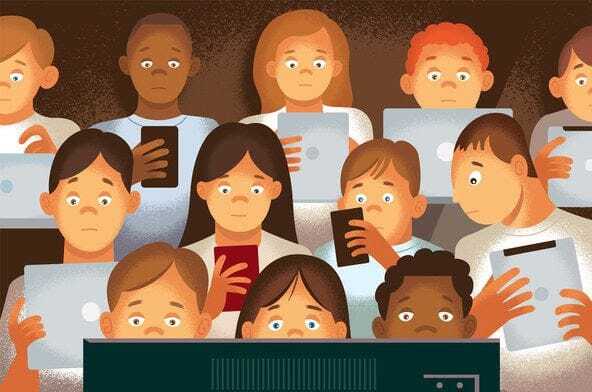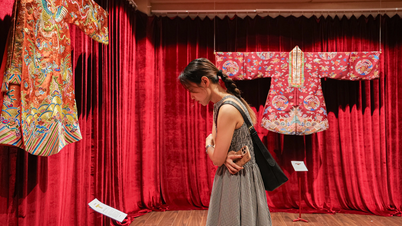Emotional and cognitive distortions
Noisy incidents like ViruSs and Ngoc Kem, or the 'denunciations' from other celebrities, are reflecting an alarming reality: influential people are using social networks to turn their personal stories into drama stages with a series of plays.
Private, sensitive details are exposed, questions are raised, and the audience, as viewers, feel responsible for finding out the truth. They not only 'watch the drama' but also actively participate in the 'investigation', from reviewing documents, searching for information, to making hypotheses and comments.
This phenomenon, according to Associate Professor Dr. Tran Thanh Nam - Vice Principal of the Universityof Education , Vietnam National University, Hanoi, is leading to a deviation in the perception and behavior of young people. "Young people today are willing to spend money on useless content just to satisfy temporary emotions, instead of investing in real values," he said. "They waste time, money, and mental health just to follow useless, valueless information."
What motivates social media users to engage in 'exposés'?
Associate Professor Dr. Tran Thanh Nam believes that there are many reasons: They crave to update new, sensational information, to feel that they are 'in the game'. They want to witness the ugly, private lives of famous people, to feel that they have the right to judge and compare, and from there feel that their lives are 'not as bad' as they think.
Today’s youth, instead of developing life skills, learning, and creativity, are caught up in endless debates on social media. This makes them stressed, anxious, and easily psychologically disturbed by information overload, especially negative information.
"From there, it creates an illusion about life, making young people feel dissatisfied with their reality. They turn to drama stories as a pain reliever, to escape real problems," Associate Professor Dr. Tran Thanh Nam commented.
Lack of critical thinking and financial awareness makes it easy for many people to spend money on useless content, just to satisfy temporary emotions. They believe in advertisements and marketing tricks, without realizing that they are being psychologically manipulated.
"Drama stories not only affect young people's awareness but also directly impact their mental health," said Mr. Nam.
Associate Professor Dr. Tran Thanh Nam emphasized that in these dramas, the people who benefit the most are not the public but the people involved - those who know how to make money from the public's curiosity.
They create stories to attract attention and profit from selling advertising, 'copycat' products, and even from charging viewers to participate in the debates. On the contrary, the biggest losers are the online community, who unwittingly become 'victims' of these tricks.
Celebrities 'sell' their privacy, platforms 'insensitive'
Social media, with its limitless connectivity, has created a 'golden age' for influencers. However, behind the halo lies an alarming reality of moral degradation of both celebrities and social media platforms.
Many influencers, instead of using their influence to spread positive values, focus on profits and virtual interactions, regardless of the negative consequences for society. They 'deviate' from knowledge, skills and professional ethics, creating toxic dramas that negatively affect young people.
Associate Professor Dr. Tran Thanh Nam emphasized: "Influencers should be considered as a real profession, requiring strict ethical standards." Ethical violations should be strictly handled, even blocking active accounts, to deter and create a healthy social networking environment.
Not only influencers, "social media platforms also contribute significantly to amplifying negative dramas," said Associate Professor Dr. Tran Thanh Nam. Their algorithms prioritize increasing views and interactions while ignoring negative impacts on the community, leading to the spread of "view-baiting" tricks regardless of value.
According to Associate Professor Dr. Tran Thanh Nam, the spread of toxic content on social networks is creating a chain effect, eroding good cultural and aesthetic values among young people, making them easily caught up in deviant trends. He posed a painful question: "How many young people really experience chamber music, how many people look at the painting and reflect? Vietnamese youth are being attracted to sensational content, private scandals, negative drama, instead of true cultural and artistic values."
The sad reality is that these dramatic events not only create a toxic environment for young people, but also have a profound impact on the country's development. We are facing a paradox: while the whole world is witnessing a technological revolution that requires high-quality human resources, Vietnam lacks experts in the fields of artificial intelligence and basic science .
"Is it possible that part of the reason lies in the fact that young people are being attracted to frivolous stories, 'gossip' and 'hit' drama on social networks, instead of focusing on important, constructive areas that contribute to society?", Mr. Nam said.
Communication and education create 'shields'
In the fight against toxic drama on social media, we cannot rely on celebrities or social media platforms alone to make changes. We need the cooperation of the whole society, especially the important role of mainstream media and community education.
"Mainstream media cannot keep up with the viral speed of social networks, but it possesses the power to orient ideology and information," Associate Professor Dr. Tran Thanh Nam commented.
He emphasized that, in addition to guiding information, "mainstream media must also play the role of 'prosecutors' of society, creating pressure for authorities to take action". This requires the press to create works that can move the community, analyze dramas in depth and from many perspectives, help the public understand the nature of the problem, and avoid being caught up in negative emotions. At the same time, it is necessary to promptly reflect on inappropriate issues and illegal acts on social networks, requesting authorities to investigate and handle them.
Not only that, the press also has the responsibility to spread cultural and artistic values, good examples, and create positive content that has a strong influence in the community. Another important thing is to "avoid reporting news that stimulates negative curiosity among young people, causing social network algorithms to continue to spread toxic content," said Mr. Nam.
However, remember that the most effective 'vaccine' to combat toxic drama on social networks, according to Associate Professor Dr. Tran Thanh Nam, is education. He emphasized that building strategies to educate the community about online conduct and help users clearly understand their responsibilities is extremely important.
In addition, strengthening education for young people on how to use social networks safely and healthily, knowing how to distinguish between right and wrong, good and bad, and avoiding being lured by negative content is also an essential measure. And to achieve optimal effectiveness, close coordination between family, school and society in educating and guiding young people to use social networks effectively is indispensable.
"Only by working together to create a healthy social networking environment can we help young people develop their talents, contribute to society and build a better future," Associate Professor Dr. Tran Thanh Nam emphasized.
(According to congluan.vn)
Source: http://baovinhphuc.com.vn/Multimedia/Images/Id/125921/Mang-xa-hoi-





![[Photo] Funeral of former President Tran Duc Luong in Quang Ngai](https://vphoto.vietnam.vn/thumb/1200x675/vietnam/resource/IMAGE/2025/5/25/ccf19a3d8ea7450bb9afe81731b80995)
![[Photo] French President Emmanuel Macron and his wife begin state visit to Vietnam](https://vphoto.vietnam.vn/thumb/1200x675/vietnam/resource/IMAGE/2025/5/25/03b59c7613144a35ba0f241ded642a59)
![[PHOTO] Hanoi fences off demolition of "Shark Jaws" building](https://vphoto.vietnam.vn/thumb/1200x675/vietnam/resource/IMAGE/2025/5/25/1b42fe53b9574eb88f9eafd9642b5b45)
![[Photo] Welcoming ceremony for Prime Minister Pham Minh Chinh and his wife on an official visit to Malaysia](https://vphoto.vietnam.vn/thumb/1200x675/vietnam/resource/IMAGE/2025/5/25/dc30203c3ae24da3990266ec3b29bb2d)

![[Photo] Ea Yieng commune settlement project abandoned](https://vphoto.vietnam.vn/thumb/1200x675/vietnam/resource/IMAGE/2025/5/25/57a8177361c24ee9885b5de1b9990b0e)














































































Comment (0)